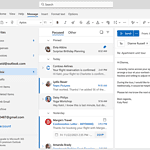Once known for its iconic smartphones, BlackBerry has shifted its focus to becoming a leader in cybersecurity and enterprise software. The company, originally founded as Research In Motion in 1984, experienced significant changes in its business model. With the smartphone market evolving, BlackBerry recognized the need to pivot from hardware to software services. Today, BlackBerry is a prominent player in providing secure communication and productivity solutions across various industries.
The company’s transformation reflects a strategic move to capitalize on the growing demand for cybersecurity in an increasingly connected world. BlackBerry now offers specialized software and services designed to secure IoT devices and enterprise systems. Its expertise extends to securing mobile applications, medical devices, vehicles, and more. This pivot to cybersecurity showcases BlackBerry’s ability to adapt to the tech market’s changes and remain relevant by offering valuable services to businesses and government agencies around the globe.
BlackBerry’s Evolution: From Smartphones to Cybersecurity Powerhouse
Cybersecurity Solutions
BlackBerry has transformed into a leading provider of cybersecurity and embedded software solutions. Its expertise in securing endpoints, networks, and data is crucial in today’s increasingly connected world.
- BlackBerry Cylance: This AI-driven endpoint security platform uses machine learning to proactively detect and prevent cyber threats.
- BlackBerry UEM: A unified endpoint management platform that simplifies the management and security of mobile devices, desktops, and IoT devices.
- BlackBerry AtHoc: A critical event management solution that helps organizations communicate and respond effectively during crises.
Embedded Software Solutions
BlackBerry’s QNX software platform is widely used in embedded systems, particularly in the automotive industry. It powers critical systems like infotainment, advanced driver-assistance systems (ADAS), and digital instrument clusters.
- QNX Neutrino RTOS: A real-time operating system designed for safety-critical embedded systems.
- QNX Hypervisor: A virtualization platform that allows multiple operating systems to run securely on the same hardware.
- QNX Software Development Platform (SDP): A comprehensive set of tools for developing, debugging, and deploying embedded software.
Other Business Areas
While cybersecurity and embedded software are BlackBerry’s primary focus, the company also has other business ventures, including:
- BlackBerry IVY: A cloud-connected software platform that aims to unlock the value of vehicle data for automakers and drivers.
- Licensing and Intellectual Property: BlackBerry continues to generate revenue through licensing its patents and technologies.
Key Partnerships
BlackBerry has forged strategic partnerships with several leading companies in the automotive, cybersecurity, and technology sectors. These partnerships help BlackBerry expand its reach and accelerate innovation in its target markets. Some notable partners include:
- Amazon Web Services (AWS): Collaborating on BlackBerry IVY.
- Baidu: Integrating QNX software into Baidu’s autonomous driving platform.
- Microsoft: Partnering on cybersecurity solutions.
A Look Ahead
BlackBerry’s transformation from a smartphone pioneer to a cybersecurity leader is a testament to its adaptability and commitment to innovation. The company’s focus on securing the Internet of Things (IoT) and providing secure embedded software solutions positions it well for continued growth in the future.
Summary of BlackBerry’s Current Focus
| Area | Key Offerings |
|---|---|
| Cybersecurity | BlackBerry Cylance, BlackBerry UEM, BlackBerry AtHoc |
| Embedded Software | QNX Neutrino RTOS, QNX Hypervisor, QNX SDP |
| Other | BlackBerry IVY, Licensing and IP |
Key Takeaways
- BlackBerry transitioned from smartphone manufacturing to specializing in cybersecurity and enterprise software.
- The company now secures a wide range of IoT devices and enterprise systems.
- BlackBerry continues to adapt to market changes, maintaining its relevance in technology.
BlackBerry’s Evolution
BlackBerry has shifted from a device-centric company to one that prioritizes software and security services. This transition tracks their progress from mobile pioneers to leaders in technology for various sectors.
Transition to Software and Services
BlackBerry ceased making its own smartphones to focus on software. They now create programs that firms use to manage devices and data. This switch allowed them to support a wide range of industries with secure and private software solutions. Their portfolio includes cybersecurity and data protection services.
Automotive and Embedded Systems
With the robust QNX platform, BlackBerry entered the automotive and embedded systems markets. They provide software that powers vehicle systems, medical devices, and industrial controls. This technology is safety-certified and used in millions of vehicles. It shows their drive to innovate in complex environments.
Security and Critical Event Management
Their security software defends against cyberattacks. BlackBerry ensures safe data handling and privacy for enterprises and governments. Intelligent security systems and critical event management tools help large organizations maintain control and trust. Their efforts in this field secure vital information worldwide.
Licensing Patents and Software
BlackBerry has a wide range of patents. They license their technology and software, which reflects their legacy of innovation. Through licensing agreements, other companies can use BlackBerry’s technology in their own products. This includes secure communication tools and privacy-focused solutions.
Remaining Hardware and Brand Presence
While BlackBerry phones are no longer produced, their brand still carries weight. The secure and private communication legacy lives on through partnerships. BlackBerry licenses their brand to manufacturers like OnwardMobility. They still support physical keyboard users and classic BlackBerry features through these deals.







